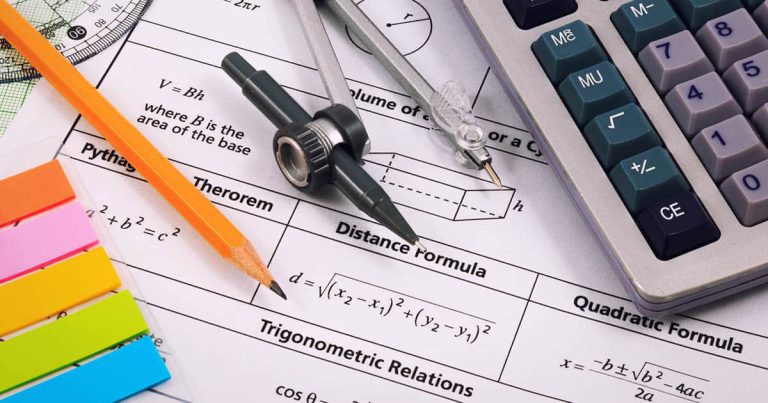Math exams can be nerve-racking. And regardless of their academic level, most students experience everything from nervousness to anxiety only thinking about their next maths exam.
Even students who’ve done their due diligence and started preparing early can fail due to increased anxiety and mental disorganization during the exam.
To ensure you achieve the best results during your next maths exam, it’s important to start preparing early because math is a cumulative subject that builds upon itself. If you do that, you’ll have a greater chance of succeeding.
Simulated exams can also increase your chance of success because they are a great way to familiarize yourself with the setting of a maths exam, recap your lessons, address knowledge gaps, and practice until you are happy with your results.
Last but not least, you can only make it through the exam if you’re rested, so ensure you get plenty of sleep before the big day so you can be focused and swift when solving problems.
Plus, you should really try the following tips during your exam to ensure you complete all exercises correctly and on time.
1. Be Mindful Of The Time Limit
All tests and exams have a time limit, that’s what makes them so stressful for many students. Ideally, you should practice working under time pressure before your maths exam. You can work with a tutor to help you maximize your time or you can set up a timer yourself when you do your homework.
During the exam, divide the time you have by the number of problems you have to solve and estimate how much time you should spend on each exercise. For example, if you have 100 minutes for the exam and 100 exercises to solve, you should spend one minute at most on each exercise.
So, estimate how much time you have on each problem and if you encounter difficulties with some of them along the way, just skip them. Otherwise, you risk wasting time and missing the opportunity to solve another problem you might be good at. You can always return to the unsolved exercise after completing the rest of them.
2. Read Everything Before You Get Started
Don’t read the first problem and immediately attempt to solve it. Give yourself a minute to read through each problem and mark the ones that seem difficult to solve immediately. Then, solve the unmarked problems and only move on to the difficult ones once you’re done with the easy ones.
Doing that will not only help you maximize your time, but it will also help you build up toward solving the problems that seem more difficult at the first glance. Once you get some practice solving the simpler problems, the complex ones won’t seem that difficult anymore.
3. Ensure You Follow Directions Carefully
Exam problems and questions tend to be very specific. So make sure you read everything carefully, twice if necessary, and ask your instructor or supervisor if something seems unclear. It’s better to clarify any confusion than to solve something based on what you assume the problem is.
Also, some exercises require a specific number of decimals or units to be added. A missing decimal or unit can end up in zero points, which will affect your overall score. So, pay extra attention to rounding and units to ensure you get the maximum score.

4. Use A Draft Sheet To Avoid Errors
Before you write down your answers, it’s a great idea to conceptualize and strategize how you’re going to solve a certain problem. Writing everything down helps, but make sure you do so using a draft sheet first to avoid errors.
This will also help you maintain focus and not lose yourself in the problem-solving process. You can also draw diagrams to visualize problems and identify the missing elements. Obviously, drafting your answers takes time so if you don’t have enough time to spare, only draft answers for complex problems that you find to be more difficult.
5. Do A Quick Check When You’re Ready
Before handing over your exam answers, you should consider saving a few minutes simply for verification purposes. As the saying goes, hindsight is 20/20. So, things may stand out in retrospect. You might notice you’re missing a decimal somewhere or maybe you forgot to copy something from your draft sheet.
Either way, double-checking everything before exiting the examination room is a healthy practice that will help you go over your answers, verify if everything is correct, and gain a greater understanding of how you’ve performed.
It may be difficult to double-check yourself if you’re struggling to finish on time. But if you divide your time accordingly, you shouldn’t have any issues.
Likewise, if you solve all exam problems before the time limit expires, don’t exit the room immediately. Understandably, you want to instantly experience the relief of surviving the maths exam, but the quick double-check will only cost you a couple of minutes more.
Start Preparing Early For Your Next Maths Exam!
Although these last-minute tips are a good way for you to navigate through your next maths exam, preparation is key. And the best way to ensure you’re getting the practice you need for a specific maths test or exam is to work with a tutor.
At OMC, we have developed diverse math tutoring programs for every academic level and need. Our math tutors can help you address knowledge gaps, recap for your exam, and find ways to maximize your time.
For more information, please feel free to reach out to us.